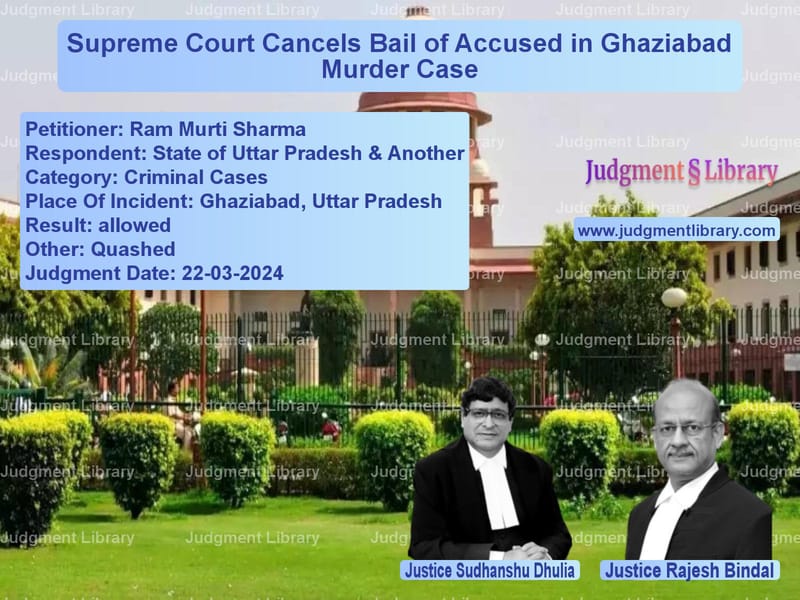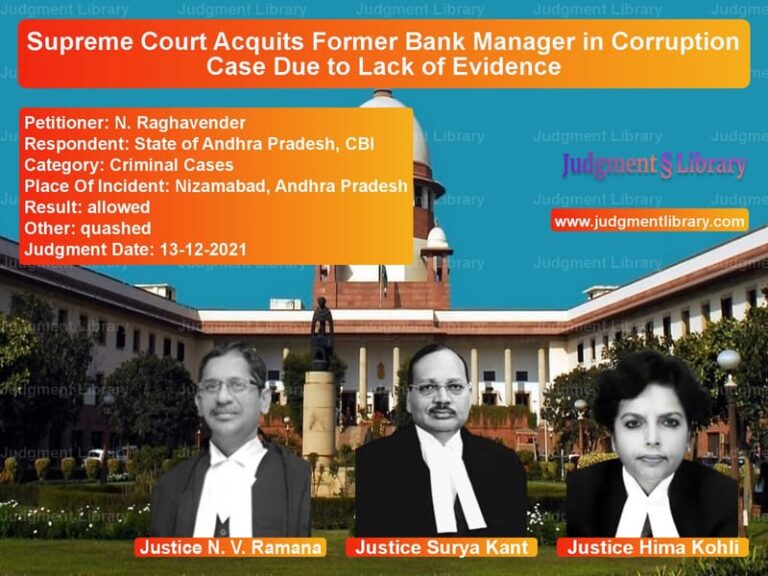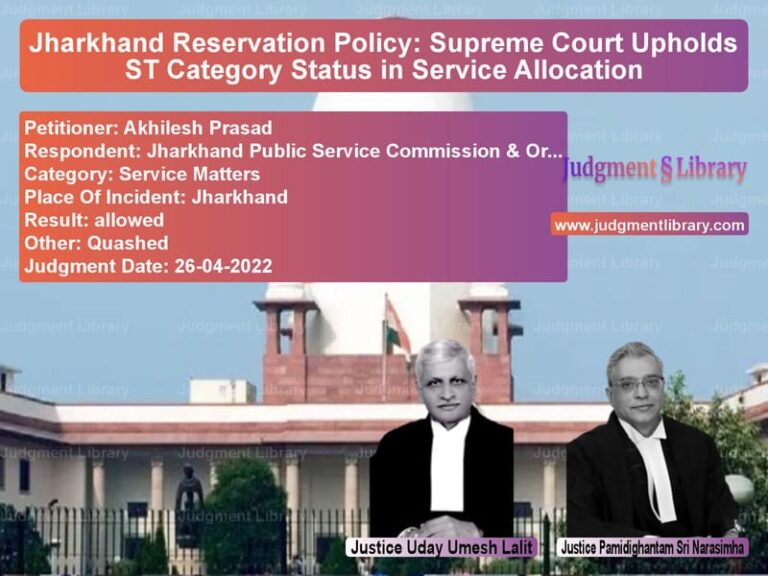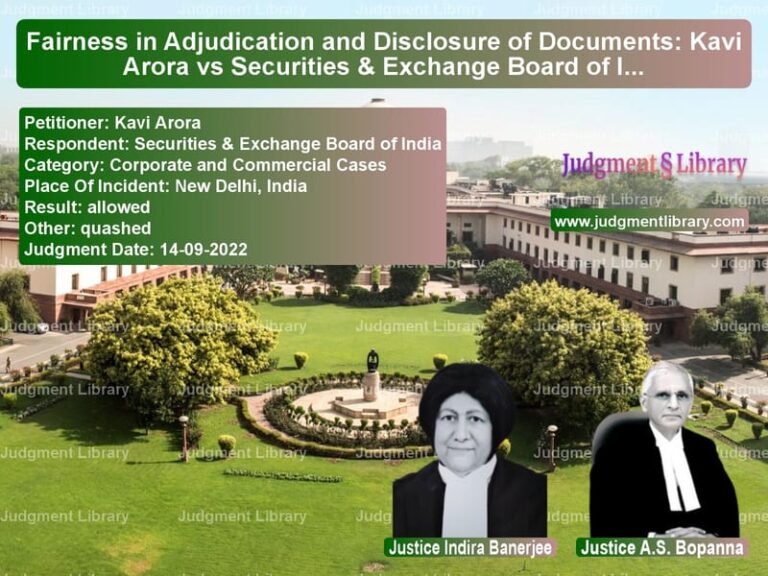Supreme Court Cancels Bail of Accused in Ghaziabad Murder Case
The Supreme Court of India has set aside the bail order granted by the Allahabad High Court in a murder case, ruling that the High Court failed to properly examine the seriousness of the allegations. The case, Ram Murti Sharma vs. State of Uttar Pradesh & Another, pertains to the murder of the appellant’s son, where the respondent (accused) was initially not named in the FIR but was later found involved during the police investigation.
The Supreme Court held that the High Court erred in granting bail without adequately considering the Sessions Court’s detailed findings, which had previously denied bail based on strong evidence. The Court directed the accused to surrender within three weeks while allowing him the liberty to file a fresh bail application at a later stage.
Background of the Case
The case concerns the murder of the appellant’s son, for which FIR No. 733 of 2022 was lodged on June 12, 2022, at Indirapuram Police Station, Ghaziabad. Initially, the respondent (accused) was not named in the FIR. However, as the police investigation progressed, evidence emerged linking him to the crime.
Read also: https://judgmentlibrary.com/supreme-court-transfers-investigation-of-2013-delhi-murder-case-to-cbi/
The accused was taken into custody on June 15, 2022, and subsequently applied for bail before the Sessions Court, Ghaziabad, which was dismissed on September 23, 2022, citing strong prima facie evidence.
High Court Proceedings
1. Bail Granted by the High Court
- The respondent filed a fresh bail application before the Allahabad High Court (Criminal Misc. Bail Application No. 4895 of 2023).
- The High Court granted bail on August 3, 2023, without detailed reasoning, merely observing that prolonged incarceration of the accused warranted bail.
2. Appeal Against the Bail Order
- The appellant (victim’s father) challenged the High Court’s bail order in the Supreme Court, arguing that the decision did not consider the severity of the allegations or the Sessions Court’s detailed observations.
- The State of Uttar Pradesh also supported the appellant’s stand, though it did not formally challenge the bail order.
Supreme Court’s Key Observations
1. Involvement of the Accused Established in Investigation
“Though the respondent was not initially named in the FIR, the investigating agency, after thorough scrutiny, gathered substantial evidence pointing to his involvement in the crime.”
2. Sessions Court’s Detailed Findings Ignored
- The Supreme Court noted that the Sessions Judge had thoroughly examined the evidence and denied bail for justifiable reasons.
- The High Court, however, did not consider these findings and granted bail with a cursory order.
“The material collected was discussed in detail by the Sessions Judge while rejecting the bail application. However, the High Court, without proper reasoning, directed for release on bail.”
3. High Court’s Order Lacked Sufficient Justification
“Merely stating that the accused had suffered incarceration for over a year is insufficient to justify bail in a case of heinous crime like murder.”
4. Conduct of the Accused Post Bail
- The respondent’s counsel argued that he had abided by the law after being released on bail and that there were no complaints about his conduct.
- The Supreme Court noted that post-bail conduct is relevant but does not override the need for a proper judicial assessment of the allegations.
Final Verdict
The Supreme Court set aside the High Court’s bail order and ruled:
“The impugned order passed by the High Court is set aside. The respondent no.2 is granted three weeks’ time to surrender. However, nothing in this order shall prejudice the respondent in any subsequent proceedings, and he is free to file a fresh bail application at an appropriate stage.”
Conclusion
The Supreme Court’s ruling reinforces key principles of bail jurisprudence:
- High Courts must provide detailed reasoning in bail orders – Mere reference to prolonged incarceration is not enough in serious crimes.
- Lower court findings must be considered – The decision of the Sessions Court rejecting bail should have been scrutinized before granting bail.
- Judicial discretion must be exercised carefully in murder cases – Bail should not be granted without a proper assessment of the severity of the allegations.
- Post-bail conduct does not justify an erroneous bail order – If bail was wrongly granted, its subsequent compliance does not validate the initial error.
This judgment sets a precedent for ensuring that bail decisions in serious criminal cases are made with due diligence and proper judicial reasoning.
Petitioner Name: Ram Murti Sharma.Respondent Name: State of Uttar Pradesh & Another.Judgment By: Justice Sudhanshu Dhulia, Justice Rajesh Bindal.Place Of Incident: Ghaziabad, Uttar Pradesh.Judgment Date: 22-03-2024.
Don’t miss out on the full details! Download the complete judgment in PDF format below and gain valuable insights instantly!
Download Judgment: ram-murti-sharma-vs-state-of-uttar-prade-supreme-court-of-india-judgment-dated-22-03-2024.pdf
Directly Download Judgment: Directly download this Judgment
See all petitions in Murder Cases
See all petitions in Bail and Anticipatory Bail
See all petitions in Judgment by Sudhanshu Dhulia
See all petitions in Judgment by Rajesh Bindal
See all petitions in allowed
See all petitions in Quashed
See all petitions in supreme court of India judgments March 2024
See all petitions in 2024 judgments
See all posts in Criminal Cases Category
See all allowed petitions in Criminal Cases Category
See all Dismissed petitions in Criminal Cases Category
See all partially allowed petitions in Criminal Cases Category







